The popularity of dairy substitutes has risen over the years since most dogs cannot properly digest cow milk. These lactose-free variants available in the market are almond milk, soy milk, coconut milk, and oat milk.
Can dogs drink lactose-free milk? As stated by the American Society for the Prevention of Cruelty to Animals (ASPCA), dogs can consume lactose-free milk. However, these lactose-free substitutes should be taken in moderation as they can still cause gastrointestinal and weight problems for your pup if too much is consumed.
You should also stay away from some ingredients in these products that can endanger the life of your dog.
For this reason, we will go through various dairy substitutes and determine if they are suitable for your dogs.
Oat Milk For Dogs
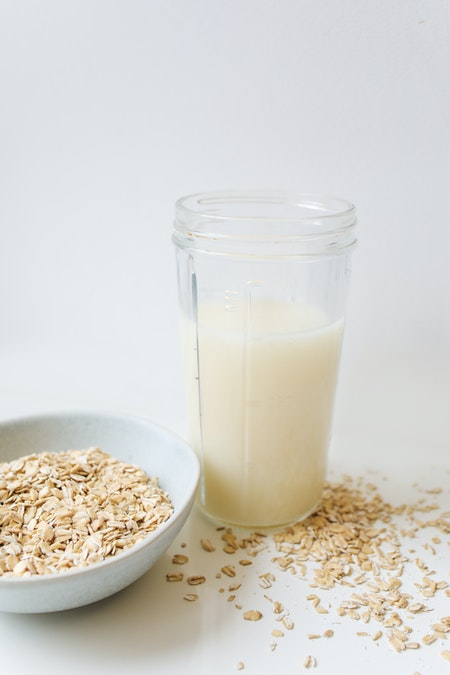
Oat milk is one of the latest lactose-free products on the available market for human and pet consumption.
It is extracted from oats. Therefore, oat milk still has the nutrients from natural oats. According to PetMD, it is a safe food for dogs that can keep their skin firm and healthy. It can also regulate their blood sugar levels.
Moreover, oat milk does not contain allergens and irritants that can be harmful to dogs. It’s a good source of fiber that can regulate their bowel movement.
It is enriched with several nutrients and minerals that are good for your dog’s bone health.
It also prevents anemia and boosts your dog’s immune system.
In summary, oat milk is suitable for dogs. However, this does not mean you should feed your dog’s oat milk in large quantities. PetMD states that they serve oat products to your dogs in moderation.
Also, ASPCA highlights that you should watch out for additives in oat milk such as xylitol and chocolate as they are poisonous for dogs.
Almond Milk for Dogs
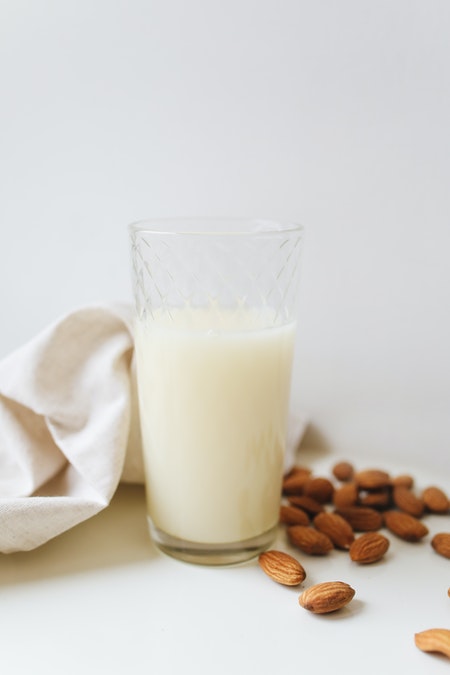
Dogs become lactose intolerant when they reach a certain age, mostly past their growing stage. It happens because lactase, an enzyme produced by dogs, slows down as they enter adulthood.
Since almond milk is plant-based, it does not contain lactose. Thus, dogs can easily digest it.
Aside from the fact that it is lactose-free, it is delicious and creamy. Hence, dogs consume it a lot.
However, the truth is, almond milk poses risks to dogs. While it’s low in calories, it does contain heaps of fats, which leads to your dog’s obesity.
Most almond milk products in the market only contain small amounts of real natural almonds. This means that it can cause diabetes mainly if the product contains sugars and other additives.
Since almond milk undergoes straining and filtering, it reduces the nutritional value, especially the protein content, which is beneficial for dogs. For this reason, most argue that almond milk does not provide many benefits for the dog’s health.
As a verdict, dogs can consume almond milk as long as it is in small to moderate quantities. However, if you’re concerned about its nutritional benefits, it does not provide much that can improve your dog’s health.
Soy Milk for Dogs
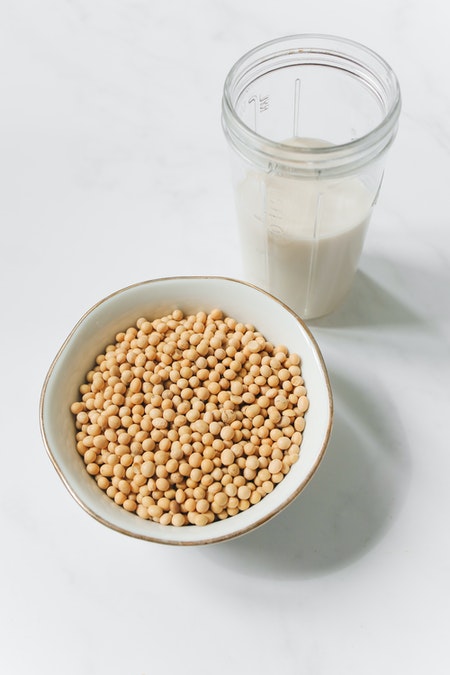
Soy milk has been in the market for a while now as a substitute for cow’s milk. The reason is it contains lots of calcium that is good for humans and even dogs.
Generally, soy milk is somewhat safe for dogs. The reason is it contains isoflavones, which have anti-inflammatory properties beneficial for dogs. It also contains soy protein that helps reduce urinary infection and problems in canines.
However, soy milk provides disadvantages similar to almond milk. While it contains lots of proteins and other nutrients, it is caloric dense.
One cup of soymilk already contains 130 calories. Added to the fact that a dog should consume calories between 25 and 30 pounds of body weight, it can cause it to suffer from indigestion and obesity, mostly if consumed in large amounts.
Just like cow’s milk, some dogs can be allergic to soybeans. While this is a rare case, it happens with most dogs.
Once you see signs of licking, vomiting, ear infections, and diarrhea from your dog, this means that your dog is allergic to soy milk. Therefore, you should no longer include soy products in your dog’s meal.
Also, watch out for other ingredients present in soy milk products. Some of these products contain chocolate flavor or raisins, which are known to be toxic for dogs. Watch out for xylitol as well, as it is highly toxic to your dog.
Coconut Milk for Dogs
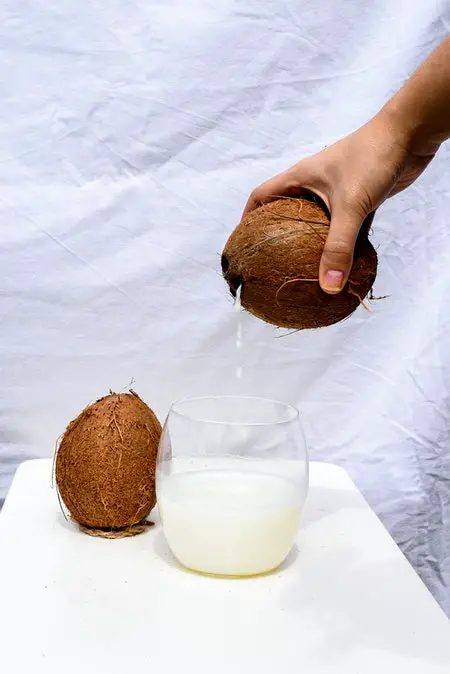
Coconut milk has been a surging trend over the recent years due to its health benefits. The good news is, it is not toxic for dogs and can help them fight viruses, improve immune system and breath, and add shine to their hair.
However, as with all products, there are things to consider to ensure coconut milk is not harmful to your dog.
First, it must be organic and free of preservatives, sugars, pesticides, and additives. These ingredients can harm your dog. As much as possible, let your dog consumes coconut milk that is not processed.
Second, dogs can acquire intolerance to certain foods. For this reason, stop feeding coconut milk to them if they show signs of diarrhea, vomiting, or stomach upset. You can also consult your veterinarian to determine if coconut milk is safe for your dog.
Lastly, avoid feeding your dog with the whole pulp of coconut. Consuming coconut meat is not easy for the dog’s digestive system. The pulp also contains fats that can be too much for your dog.
How About Goat’s Milk?
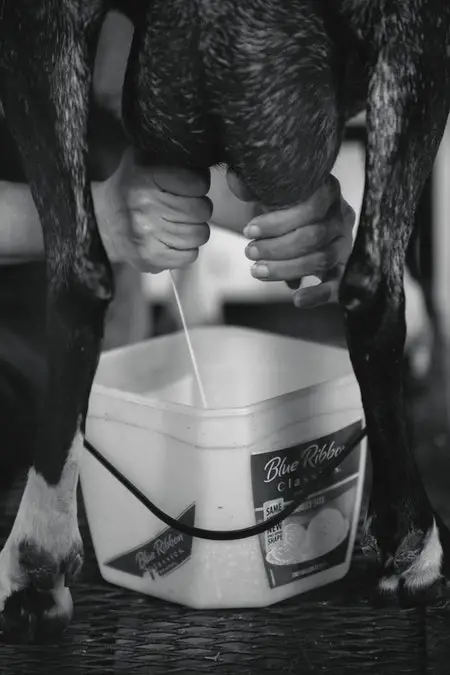
As mentioned, dogs cannot digest lactose when they reach adulthood or at a certain age. Since goat milk contains small to high amounts of lactose, some dogs cannot tolerate it.
National Center for Biotechnology Information (NCBI) states that some dogs cannot digest lactose and other sugars present in most goat’s milk products. As a result, it can cause them to suffer from diarrhea and dehydration.
NCBI added that goat milk products are a better match against commercial dog’s milk. However, they still contain lactose.
While the amounts of lactose vary depending on the product, it is not safe for dogs. Thus, it is not recommended as a milk replacer.
The Bottom line – Can Dogs Drink Lactose-Free Milk?
Dogs can safely consume lactose-free products such as almond milk, soy milk, coconut milk, and oat milk. However, take note of some considerations emphasized by ASPCA when giving these products to your dog.
Read the detailed ingredients in your dairy-free products. Some products contain fortified vitamins and minerals, and others have sweeteners, stabilizers, and emulsifiers. Some of these ingredients are not safe for dog consumption.
Sweeteners such as xylitol and chocolate flavor are common sugar substitutes for dairy-free products. These ingredients are highly toxic as they can lead to life-threatening issues for dogs, such as liver problems and low blood sugar.
Also, let your dog consume these dairy substitutes in moderation. Many foods safe for human consumption can still cause diarrhea and other health problems to dogs as they can establish intolerance for some of the lactose-free products.
Most importantly, it’s safe to check your dog with a veterinarian to ensure you’re feeding your dog the right food.

